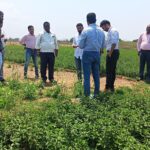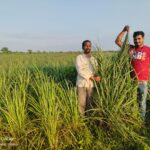Over the last 50-years, with the exception of a few states, the economics of agricultural operations for an Indian farmer has been on the decline. According to a Press Information Bureau release PIB Link the Agriculture Census estimates that the average size of operational holdings of farmers decreased from 2.28 hectares in 1970-71 to 1.08 hectares in 2015-2016. Research shows that this fragmentation of land holdings has been accompanied by reducing productivity or yields per hectare. In a fascinating paper titled ‘The Great Indian Migration Wave, 1870-2010: Persistence & Consequences’ author Chinmay Tumbe observes the mass migration of men from rural to urban areas for employment opportunities and the resultant high ratio of women in agriculture and labour shortages in rural India.
However, over the last decade, the advent of agri-tech companies has brought the promise of a much brighter future for farmers and rural India. Interestingly during the pandemic, India witnessed reverse migration from urban to rural areas. A @NABARD article titled ‘COVID-19 Crisis Through a Reverse Migration Lens’ by Balwinder Kaur and Shivangi Shubham notes the following:
– 47% of the reverse migrants surveyed had been engaged in urban construction with exploitative and hazardous working conditions
– Post reverse migration, 41% of surveyed respondents relied on farming as a source of livelihood
– 25% of the respondents decided to stay back in the village and 20% were unsure regarding the future course of action
We believe this is a massive opportunity for agri-tech companies, agri businesses and allied sectors to set-up operations and hire in rural India. This young rural workforce are predominantly children of farmers with extensive informal experience in farming and valuable insights into rural communities and their workings, which is an asset for any agri business. For ‘Corporate Agri India’ hiring rural can ensure better living conditions for their workforce, ensure more equitable distribution of wealth across our communities and last but not the least, add fuel to agri-rocket ship that has taken off in India.
We, at Origin Oils, are supporting several of these reverse migrants back into lucrative agriculture. Our agronomy team come from a farming ancestry and have formal agricultural education. They have an exceptional understanding of the local economy and are naturally aligned with our mission to develop rural communities. As a result, we have strong engagement with the rural communities we serve. Furthermore, by setting up world-class processing units and hiring from local rural universities for various specialist and corporate roles, we look forward to creating a significant positive impact in rural India. #OriginOils #UNSDG #RuralDevelopment






